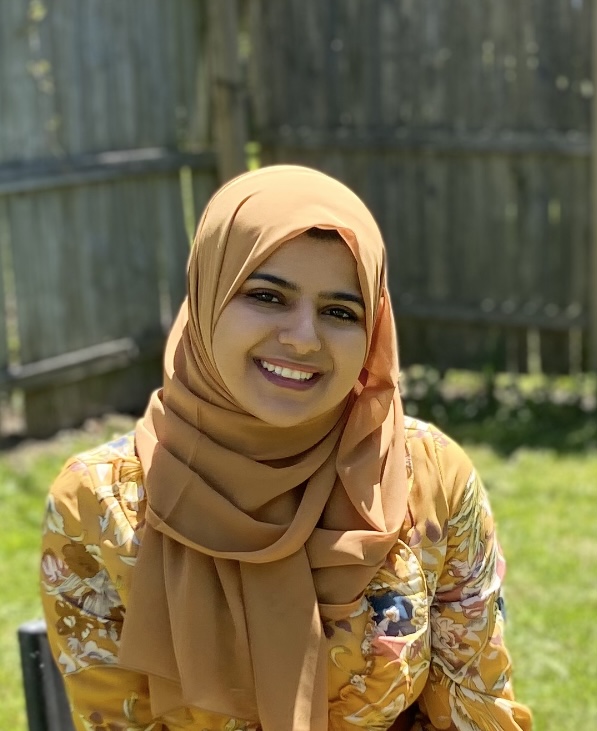Social Work students look to unmask how the aftermath of the COVID-19 pandemic affected immigrant women in Detroit
January 16, 2024 - Brandon Drain
The Provost’s Undergraduate Research Initiative (PURI) grant allows College of Social Science undergraduate students a unique opportunity to conduct transformative research – either one-on-one with a tenured faculty member, or part of a research team. This is a university-wide effort – spearheaded by The Undergraduate Research and Creative Activity Office at MSU – to provide all undergraduate students opportunities to engage in research, or creative activity throughout their education, regardless of their academic discipline or academic abilities. This year, the School of Social Work had three of its undergraduate students receive the award: Breanne Sandstorm, Jasmine Zavala Gonzalez, and Yasmen Alsuraimi.
 Both Jasmine Zavala Gonzalez and Yasmen Alsuraimi will collaborate on a community-based project that, “Focuses on how the COVID-19 pandemic is affecting women of color and immigrant women in Detroit,” Alsuraimi explained. This project looks to investigate the access of assistance resources within childcare, elderly care and the overall economic disparities that were brought on upon the COVID-19 pandemic, “And how it affects labor force participation and their access to community-based family care resources,” Zavala Gonzalez added. The team, led by School of Social Work Professor Dr. Anna Maria Santiago, hopes to uncover the persistent effects from the pandemic by focusing on these areas. “By exploring these areas, it provides a broader understanding of the ongoing struggles faced by women of color and immigrant women in Detroit,” Alsuraimi continued.
Both Jasmine Zavala Gonzalez and Yasmen Alsuraimi will collaborate on a community-based project that, “Focuses on how the COVID-19 pandemic is affecting women of color and immigrant women in Detroit,” Alsuraimi explained. This project looks to investigate the access of assistance resources within childcare, elderly care and the overall economic disparities that were brought on upon the COVID-19 pandemic, “And how it affects labor force participation and their access to community-based family care resources,” Zavala Gonzalez added. The team, led by School of Social Work Professor Dr. Anna Maria Santiago, hopes to uncover the persistent effects from the pandemic by focusing on these areas. “By exploring these areas, it provides a broader understanding of the ongoing struggles faced by women of color and immigrant women in Detroit,” Alsuraimi continued.
The significance of this project lies close to the hearts of both Zavala Gonzalez and Alsuraimi. Both being first-generation college students with immigrant parents, they each have a firsthand, nuanced perspective based in lived experiences, that enhances their overall understanding and approach to their research. “My family and I also face the social, economic and cultural challenges brought about by the pandemic,” Zavala Gonzalez expressed. “That is why having the opportunity to listen and work for a positive change within these communities is important to me as I can personally connect with the experiences of women of color and immigrant women in Detroit who share similar challenges.” Alsuraimi echoed these sentiments shared by her research partner, stating, “Whether dealing with economic hardships or social challenges, I understand the struggles of making ends meet -- especially when lacking access to a supportive community network or being unaware of available resources. This inspires me to look for opportunities to listen to other experiences and see how they've navigated or continue to confront similar challenges. By listening to their experiences, I hope to increase awareness in any community I tend to serve.”
 The two social work undergraduates believe this project will further enhance their knowledge, skillsets and overall experience within their budding careers. “I am confident that participating in this study project will have a big impact on how I approach making a positive impact in the community that I wish to serve,” Alsuraimi explained. “I hope to get more understanding and increase awareness of the difficulties that people may face. This initiative is critical to contribute to creating a successful approach to addressing the problem.” Zavala Gonzalez adds, “As a social work student, the experience of navigating and interpreting data, understanding diverse perspectives and contributing to meaningful solutions will prepare me for future opportunities and careers.”
The two social work undergraduates believe this project will further enhance their knowledge, skillsets and overall experience within their budding careers. “I am confident that participating in this study project will have a big impact on how I approach making a positive impact in the community that I wish to serve,” Alsuraimi explained. “I hope to get more understanding and increase awareness of the difficulties that people may face. This initiative is critical to contribute to creating a successful approach to addressing the problem.” Zavala Gonzalez adds, “As a social work student, the experience of navigating and interpreting data, understanding diverse perspectives and contributing to meaningful solutions will prepare me for future opportunities and careers.”
Community and social impact act as the foundation for research in the social work field. Despite being four years removed from the initial wake of the COVID-19 pandemic, a large part of the at-risk, marginalized communities still suffers the consequences of its destabilizing aftermath. What Zavala Gonzalez and Alsuraimi are doing goes beyond the formal practices of research – beyond even their own personal ties to the issue. They are each a beacon of hope in the process of restoring community cohesion and equity for immigrant women in the Detroit community. “As a woman of color who has experienced economic hardship, I want to be of help to others facing similar difficulties in any community I serve,” Alsuraimi said. “I am well aware of the need for increased awareness in order to have a meaningful impact.”

